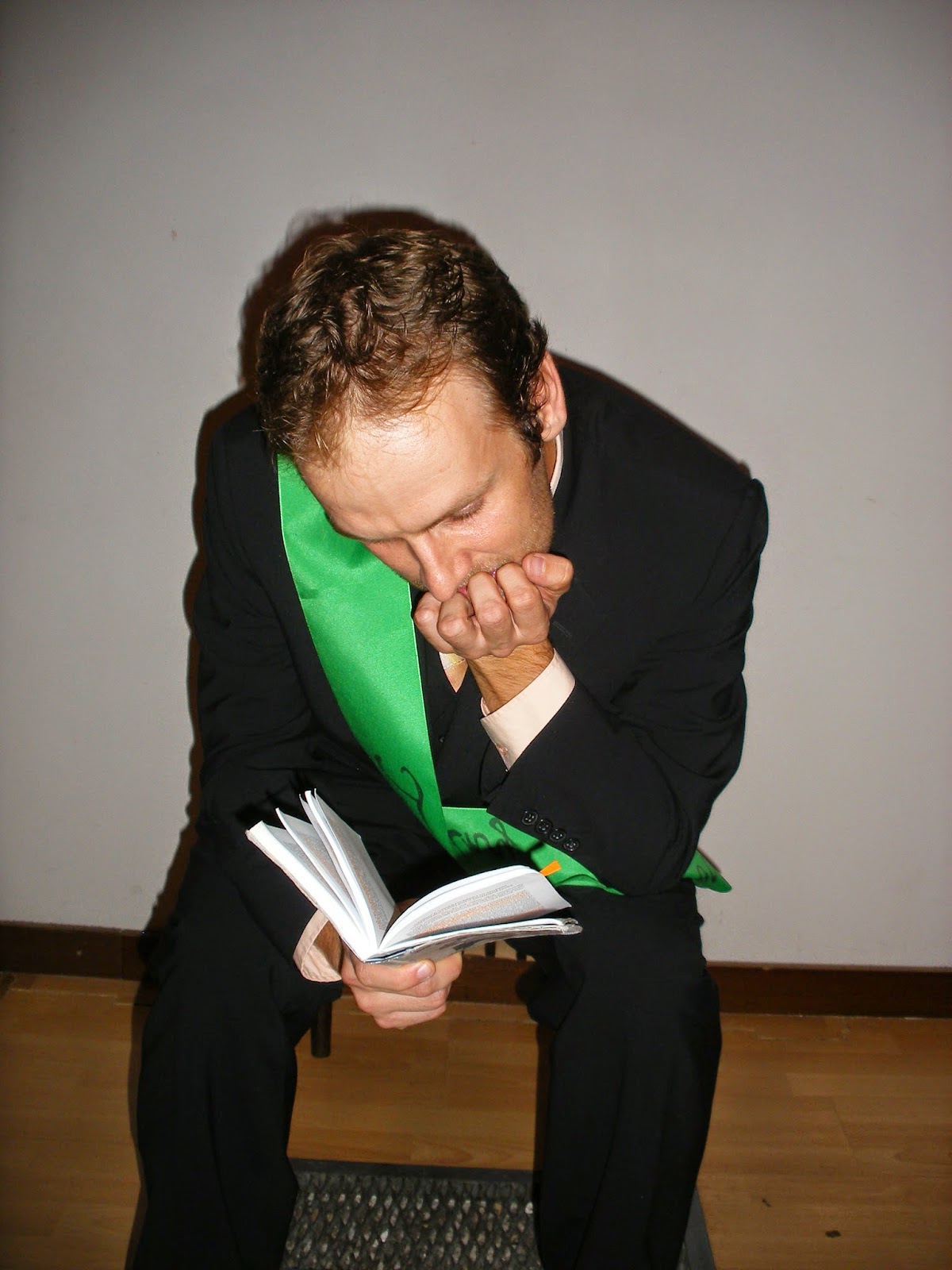Not dancing
formally with one of the fifth-year girls while parents and coworkers and other
students looked on; dancing like he meant it to “1-2-3-4” by Feist, from a CD
he’d burned specially for the event. See, during my third year Braňo somehow got roped into being the class teacher (akin
to a homeroom teacher) for 5A. Despite
his reluctance, I’m sure he performed his duties to the best of his
abilities. I’m even more sure that his
students, from that class and from all of the other ones he taught, held his
intellect in the highest esteem.
How could
they not? Everyone who knew him for more
than a few minutes had to. Braňo was one of the smartest people I’ve
ever known, if not the smartest, period.
When I knew him he was working on his dissertation for his PhD in
philosophy, focusing on Jewish philosophers; at EGT he taught philosophy and
English but only to the fourth and fifth years, because none of the younger
students would have much of a hope of keeping up with him. There were times when I couldn’t keep up with him when he was speaking my own language,
which he perfected while working, if I recall correctly, on a fishing boat in
the Pacific Northwest. Sometimes the
American teachers would take a look at the exercises he created for his English
classes, and we were often hard-pressed to come up with the correct
answers. This one has got to be my
favorite, since it combines the merciless incisiveness and humor that were so
integral to his nature.
Please just don’t annoy me with more
of your complaints! I wish you had been
born into a happier family. You would
have been given a better education and would have more confidence in
yourself. Now it’s too late.
 He loved “South
Park” and lived for bicycling. He made
us laugh, sometimes when we weren’t supposed to, and he was lazy about
translating for us at staff meetings. He
encouraged us to be “casual” at all times, and used “stunning,” with varying
levels of irony, to describe things awful to wonderful. He brought a book along to his own class’ stužková, and took a break late
in the evening to sit and read, or at least pretended to.
He loved “South
Park” and lived for bicycling. He made
us laugh, sometimes when we weren’t supposed to, and he was lazy about
translating for us at staff meetings. He
encouraged us to be “casual” at all times, and used “stunning,” with varying
levels of irony, to describe things awful to wonderful. He brought a book along to his own class’ stužková, and took a break late
in the evening to sit and read, or at least pretended to.
I hate that
he’s dead. I hate that the way he died
makes his death all the more believable.
I hate that there are people who never got the pleasure of meeting him,
and that there are students who will never have the privilege of learning from
him. I hate that, at least in my
opinion, the length of his life was not proportional to the gifts he’d been
given, and that all the good he had the potential to do and to share will never
come to pass.
But even in
his too-short time he changed people’s lives.
The day he died my Facebook feed was filled with tributes from his
former students, remembering him as the best teacher they’d ever had and
thanking him for what he’d taught them. If
it were any of his colleagues I might doubt their sincerity, but he challenged his students and laughed with them and laughed at them and I know they learned from
him, probably even more than they realize.
Here is another
of my other favorite memories. One day
the class schedule had been messed about for some very Slovak, bureaucratic
reason that hadn’t been explained to us well, if at all. In roughly equal parts frustration and actual
curiosity I asked no one in particular, “Why is this happening?” Braňo looked up across the desk in the staff room and,
face entirely straight, answered, “Because of sin.” I think I laughed then, because I wrote it
down on a sticky note; and in the years since, when I’ve felt most put-upon by
events and asked that same question, I’ve thought of his response and it’s made
me smile. Though it’s hard to think of
that answer now, I’m sure one day in the future I’ll properly appreciate it
again.
While
looking for the exercise I quoted above I found an outline that Braňo had given us of the speech he had
to give at stužková. I could easily quote the whole thing, but I
think this is the best possible way to end a tribute to him: in his own words,
with hope.
May
you be lead by something more than just cleverness or even wisdom, may you be
seized by something much better than morality, may you be broken by the joy
coming from the thankfulness to the one, whose arms were and are strong and
wide enough to carry us all, who came to give us an actual reason to be joyful,
because he not only broke the coldness and indifference of the world around
you, but also the coldness in you.
No comments:
Post a Comment